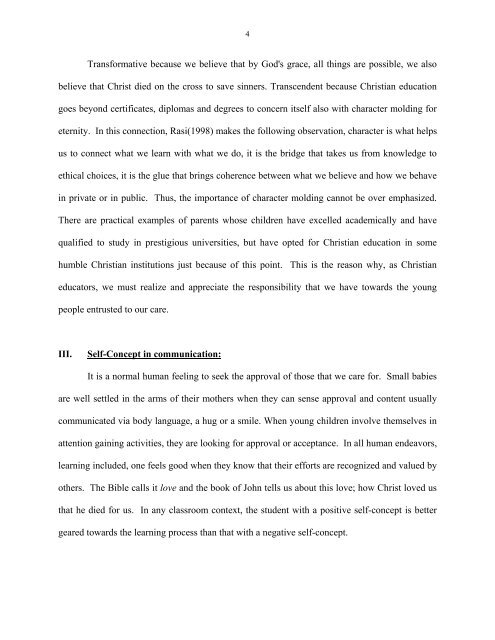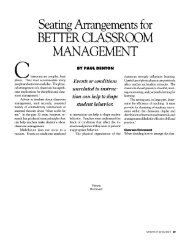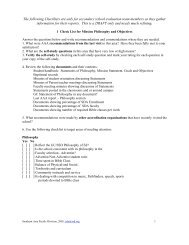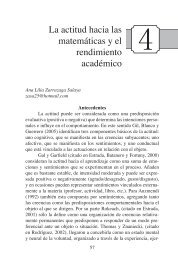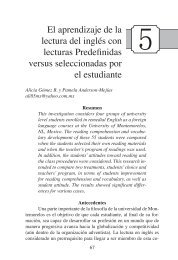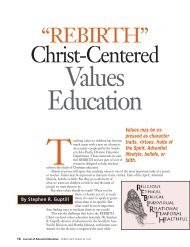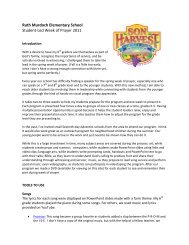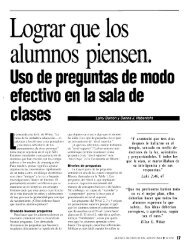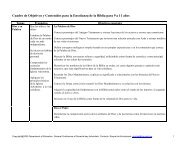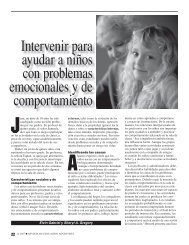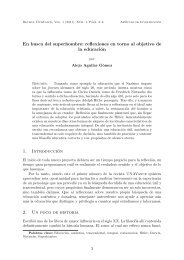Verbal Communication in the Classroom: What Christian ... - Circle
Verbal Communication in the Classroom: What Christian ... - Circle
Verbal Communication in the Classroom: What Christian ... - Circle
You also want an ePaper? Increase the reach of your titles
YUMPU automatically turns print PDFs into web optimized ePapers that Google loves.
4<br />
Transformative because we believe that by God's grace, all th<strong>in</strong>gs are possible, we also<br />
believe that Christ died on <strong>the</strong> cross to save s<strong>in</strong>ners. Transcendent because <strong>Christian</strong> education<br />
goes beyond certificates, diplomas and degrees to concern itself also with character mold<strong>in</strong>g for<br />
eternity. In this connection, Rasi(1998) makes <strong>the</strong> follow<strong>in</strong>g observation, character is what helps<br />
us to connect what we learn with what we do, it is <strong>the</strong> bridge that takes us from knowledge to<br />
ethical choices, it is <strong>the</strong> glue that br<strong>in</strong>gs coherence between what we believe and how we behave<br />
<strong>in</strong> private or <strong>in</strong> public. Thus, <strong>the</strong> importance of character mold<strong>in</strong>g cannot be over emphasized.<br />
There are practical examples of parents whose children have excelled academically and have<br />
qualified to study <strong>in</strong> prestigious universities, but have opted for <strong>Christian</strong> education <strong>in</strong> some<br />
humble <strong>Christian</strong> <strong>in</strong>stitutions just because of this po<strong>in</strong>t. This is <strong>the</strong> reason why, as <strong>Christian</strong><br />
educators, we must realize and appreciate <strong>the</strong> responsibility that we have towards <strong>the</strong> young<br />
people entrusted to our care.<br />
III.<br />
Self-Concept <strong>in</strong> communication:<br />
It is a normal human feel<strong>in</strong>g to seek <strong>the</strong> approval of those that we care for. Small babies<br />
are well settled <strong>in</strong> <strong>the</strong> arms of <strong>the</strong>ir mo<strong>the</strong>rs when <strong>the</strong>y can sense approval and content usually<br />
communicated via body language, a hug or a smile. When young children <strong>in</strong>volve <strong>the</strong>mselves <strong>in</strong><br />
attention ga<strong>in</strong><strong>in</strong>g activities, <strong>the</strong>y are look<strong>in</strong>g for approval or acceptance. In all human endeavors,<br />
learn<strong>in</strong>g <strong>in</strong>cluded, one feels good when <strong>the</strong>y know that <strong>the</strong>ir efforts are recognized and valued by<br />
o<strong>the</strong>rs. The Bible calls it love and <strong>the</strong> book of John tells us about this love; how Christ loved us<br />
that he died for us. In any classroom context, <strong>the</strong> student with a positive self-concept is better<br />
geared towards <strong>the</strong> learn<strong>in</strong>g process than that with a negative self-concept.


